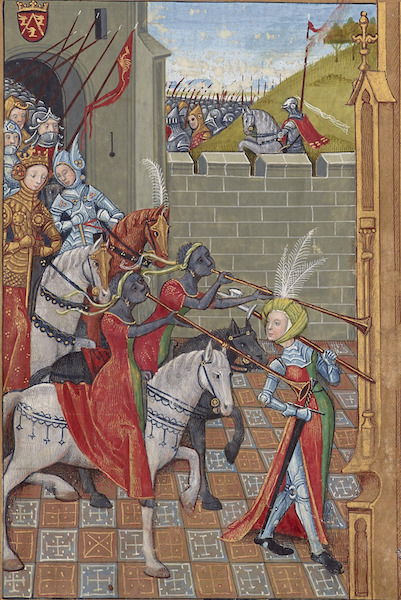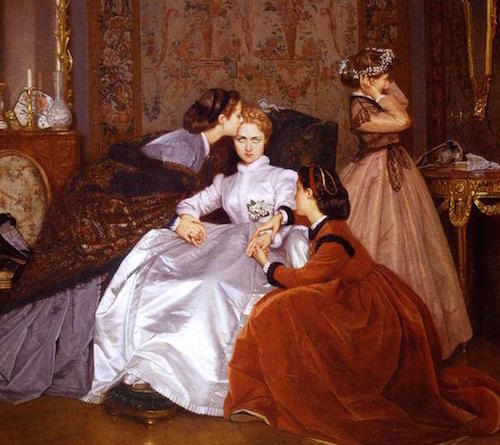Obviously the answer to both questions is yes. The real question is, Which sentence beginnings need commas and which don’t?
Dependent Clauses and Commas
When a sentence starts with a dependent clause, the clause should be followed by a comma. A dependent clause is a clause (i.e., it has a subject and a verb) that can’t stand alone as a sentence. It often starts with a word like if, because, until, or when (a.k.a. a subordinating conjunction).
- Until our enemies are defeated, we will continue to protect the castle.
- If Bao starts singing, everyone will join in.
- Because it was raining, Elphaba brought her umbrella.
When the dependent clause comes after the main clause, you don’t need to worry about a comma.
- We will continue to protect the castle until our enemies are defeated.
- Everyone will join in if Bao starts singing.
- Elphaba brought her umbrella because it was raining.
However, a comma is usual when the dependent clause doesn’t change the meaning of the main clause. (See That and Which for more on restrictive and nonrestrictive clauses.)
- We fought valiantly all day, until the sun set behind the hills.
- I’ll take a pass on the kale smoothie, if it’s all the same to you.
- Of course it was raining, because the universe hates me.
Participial Phrases and Commas
When a sentence begins with a participial phrase (a phrase starting with a participle, which usually ends in -ed or -ing), the phrase is generally followed by a comma.
- Exhausted from the gruelling flight, Nico hauled himself out of the airship.
- Knowing her cards were unbeatable, the dowager staked her entire fortune on one hand.
Commas are also used when the phrase occurs in the middle of the sentence.
- Nico, exhausted from the gruelling flight, hauled himself out of the airship.
- The dowager chuckled, knowing her cards were unbeatable, and staked her entire fortune on one hand.
However, you shouldn’t use a comma when the phrase changes the meaning of the rest of the sentence (i.e., when it’s a restrictive phrase).
- Nico always arrives exhausted from his gruelling flights.
- Knowing her cards were unbeatable was no reason for the dowager to stake her entire fortune on one hand.
Adverbial Phrases and Commas
An adverb tells you how, when, where, or why; an adverbial phrase is a phrase (a group of words that doesn’t qualify as a clause) that does the same thing. At the beginning of a sentence, these phrases can be followed by a comma, but they often go without—especially if they’re short.
- In 1918 Lu Xun published “A Madman’s Diary.”
- Before the wedding Penelope plotted her revenge.
Do use a comma when it makes the sentence easier to read or when it prevents confusion.
- After days and weeks of incessant worry, we finally discovered our cat had been living at the neighbours’.
- For Clive, Owen was the ideal man.
- After eating, the rabbits we adopted were returned to their hutch.
It’s often helpful to use commas when the adverbial phrase appears in the middle of a sentence.
- We finally discovered, after days and weeks of incessant worry, that our cat had been living at the neighbours’.
But don’t use a comma when it’s at the end of a sentence …
- Lu Xun published “A Madman’s Diary” in 1918.
- Penelope plotted her revenge before the wedding.
… unless the phrase doesn’t change the meaning of the sentence (i.e., it’s nonrestrictive).
- Lu Xun published “A Madman’s Diary” the following year, in 1918.
- Penelope plotted her revenge that morning, before the wedding.
Introductory Interjections and Commas
An interjection at the beginning of a sentence is traditionally followed by a comma.
- Yes, it was a great day for disco.
- No, that is not what I meant at all.
- Well, it was the best we could do at the time.
- Okay, that’s settled.
- Oh, it was grand!
- Ah, youth!
But the comma is often omitted in informal contexts, dialogue, and common expressions.
- “No you don’t!”
- “Yes I will!”
- Oh my God!
- Oh yeah?
- Boy oh boy.
- Oh brother!
You can also use closing punctuation instead of a comma, turning your interjection into a one-word sentence.
- Well! What a shock!
- Oh? I stand corrected.
- Oh! I didn’t hear you come in.
There’s no particular phrase that is always—or never—followed by a comma: it all depends on the phrase’s function in the sentence. In this way commas point out a sentence’s structure. Readers subconsciously expect these flags, so using them consistently will make your prose easier to read. Of course, you can also choose to deploy an unexpected comma here and there, for dramatic effect.
Follow Grammarlandia on Facebook and never miss a post.
Go to Grammarlandia’s Patreon to become a supporter and receive access to bonus content.



